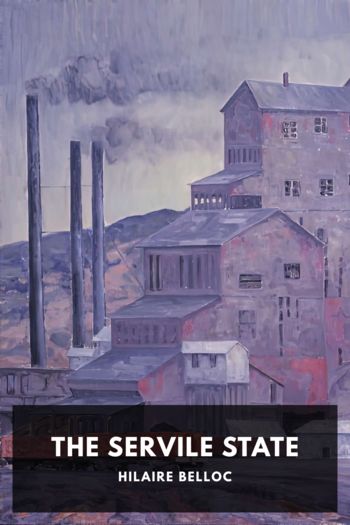The Servile State, Hilaire Belloc [ebook pdf reader for pc TXT] 📗

- Author: Hilaire Belloc
Book online «The Servile State, Hilaire Belloc [ebook pdf reader for pc TXT] 📗». Author Hilaire Belloc
The neglect of older principles as abstract and doctrinaire; the immediate need of both parties immediately satisfied; the unforeseen but necessary consequence of satisfying such needs in such a fashion—all these, which are apparent in the settlement the mining industry has begun, are the typical forces producing the servile state.
Consider in its largest aspect the nature of such a settlement.
The proletarian accepts a position in which he produces for the capitalist a certain total of economic values, and retains out of that total a portion only, leaving to the capitalist all surplus value. The capitalist, on his side, is guaranteed in the secure and permanent expectation of that surplus value through all the perils of social envy; the proletarian is guaranteed in a sufficiency and a security for that sufficiency; but by the very action of such a guarantee there is withdrawn from him the power to refuse his labour and thus to aim at putting himself in possession of the means of production.
Such schemes definitely divide citizens into two classes, the capitalist and the proletarian. They make it impossible for the second to combat the privileged position of the first. They introduce into the positive laws of the community a recognition of social facts which already divide Englishmen into two groups of economically more free and economically less free, and they stamp with the authority of the state a new constitution of society. Society is recognised as no longer consisting of free men bargaining freely for their labour or any other commodity in their possession, but of two contrasting status, owners and non-owners. The first must not be allowed to leave the second without subsistence; the second must not be allowed to obtain that grip upon the means of production which is the privilege of the first. It is true that this first experiment is small in degree and tentative in quality; but to judge the movement as a general whole we must not only consider the expression it has actually received so far in positive law, but the mood of our time.
When this first experiment in a minimum wage was being debated in Parliament, what was the great issue of debate? Upon what did those who were the most ardent reformers particularly insist? Not that the miners should have an avenue open to them for obtaining possession of the mines; not even that the state should have an avenue open to it for obtaining such possession; but that the minimum wage should be fixed at a certain satisfactory level! That, as our recent experience testifies for all of us, was the crux of the quarrel. And that such a point should be the crux, not the socialisation of the mines, nor the admission of the proletariat to the means of production, but only a sufficiency and a security of wage, is amply significant of the perhaps irresistible forces which are making in the direction for which I argue in this book.
There was here no attempt of the capitalist to impose servile conditions nor of the proletarian to resist them. Both parties were agreed upon that fundamental change. The discussion turned upon the minimum limit of subsistence to be securely provided, a point which left aside, because it took for granted, the establishment of some minimum in any case.
Next, let it be noted (for it is of moment to a later part of my argument) that experiments of this sort promise to extend piecemeal. There is no likelihood, judging by men’s actions and speech, of some grand general scheme for the establishment of a minimum wage throughout the community. Such a scheme would, of course, be as truly an establishment of the servile state as piecemeal schemes. But, as we shall see in a moment, the extension of the principle piecemeal has a considerable effect upon the forms which compulsion may take.
The miners’ refusal to work, with the exaggerated panic it caused, bred this first tentative appearance of the minimum wage in our laws. Normally, capital prefers free labour with its margin of destitution; for such an anarchy, ephemeral though it is of its nature, while it lasts provides cheap labour; from the narrowest point of view it provides in the still competitive areas of capitalism a better chance for profits.
But as one group of workmen after another, concerned with trades immediately necessary to the life of the nation, and therefore tolerating but little interruption, learn the power which combination gives them, it is inevitable that the legislator (concentrated as he is upon momentary remedies for difficulties as they arise) should propose for one such trade after another the remedy of a minimum wage.
There can be little doubt that, trade by trade, the principle will extend. For instance, the two and a half millions now guaranteed against unemployment are guaranteed against it for a certain weekly sum. That weekly sum must bear some relation to their estimated earnings when they are in





Comments (0)